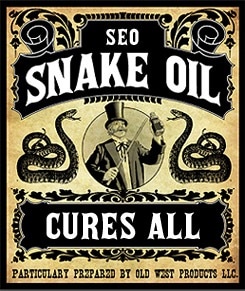
The Wild Wild West Days of SEO
Keyword Overload
When I first started working in the SEO field things were different, very different. At the time, I was working for a large eCommerce store that sold skin care products. Back then my tasks were simple.
On the moisturizing page, I was asked to use the term “moisturizer” and every variation of that word known to man as many times as possible. I used the word moisturizer so much it began to not even look like a word, just a random assortment of letters.
I was tasked to stuff the word into the page at every instance I could: into the content on the page, the image labels, the meta title, meta description, and the list went on.
I began having dreams of moisturizers barging into my room, drowning me in moisturizing lotion. It was awful and terrifying, even though I did have incredibly soft and healthy skin.
Although Google was the dominant search engine at the time it was still somewhat in its infancy stage in terms of delivering ideal search results to its users. Back then you were able to trick Google into thinking you were the authority on a topic, simply by utilizing the phrase or word hundreds (if not thousands) of times on your website.
Google, being the smart and agile company that it is, realized people were gaming the system to their advantage. Google realized that people typing in moisturizer wanted an authoritative website selling multiple moisturizers ranging in price and quality. They generally don’t want a website with a single moisturizer on it that claims to heal all your ailments (even if it does use the term 1,000 times).
Link Building Done The Wrong Way
At the same time as the keyword stuffing craze was the other SEO tactic which many people discovered how to manipulate, link building. One of Google’s core competency as a search engine was that they figured out how they could measure a website’s authority (PageRank). Google knows that users would rather see a website that is well-respected in the online ecosystem than one that is new, untested, and potentially untrustworthy.
Their algorithm reflected this and a major ranking factor for Google was the amount of links that pointed to your site and the authority of those links. Creating content that was amazingly crafted and people actually wanted to link to in order to increase your authority sounded like it would take a lot of time and work to many people involved in SEO.
So people began looking for shortcuts. How could we get a lot of links pointing to our site in a short amount of time? Oh, there were many ways to accomplish this, don’t you worry.
Some of these tactics were sneaky and cunning, others just plain ridiculous. Online marketers began creating whole websites for the sole purpose of linking to their main site. They created a black market of buying and selling links to other online marketers. They would hide links on pages, using white text over a white background. They would comment on every message board they could find, dropping a link to their website, whether it made sense or not. The list goes on and on.
Google, just as they did with keyword stuffing, caught on to what these marketers were doing and had to figure out a way to stop them. They went back to the drawing board on how to update their algorithm so that people actually had to create useful and informative sites to rank well on Google, not just laugh in Google’s face while their website that looked like it was made on Microsoft paint ranked #2 for website design company.
Modern SEO
What is a metric to rank sites that can’t be faked? That was the question that puzzled Google and haunted online marketers. You know what’s hard to fake? Real users coming to your website and finding your content meaningful. This means they spend a lot of time on your site, go to multiple pages, watch your videos, read through your blog posts, and hell, maybe even buy something.

Google determined it would now put a heavier emphasis on user experience signals when evaluating where a website should rank. Having a website that people want to click on from the Google search results and then want to actually spend time on is now a major ranking factor for Google.
They want to reward sites that attract users by having quality content people want to digest and punish sites that trick people into coming to their site, resulting in poor user engagement metrics. To some digital marketers this was an amazing step in the right direction of providing users with real, quality content.
To other digital marketers who preferred the exploitation methods, they were not as pleased.
“So you mean I actually have to perform real marketing and create meaningful content on my website? This is no fun.”
Actually, Joey from ABC Agency, this is where the fun begins.
In my opinion this is a huge step in the right direction for the online marketing industry. Of course to be successful in SEO, you still have to set up your website in a way that Google can read and provide Google with the SEO signals it needs.
However, more importantly, you have to create a website that people want to come to by having information and content on your website that people want to interact and engage with. Create interesting videos. Write compelling content. Provide users with valuable information. Answer their questions or address their needs.
Google helped put the marketing back in digital marketing.

The dark arts of SEO can still provide you with online traffic, but it is becoming less and less likely that it will provide you with real sales and leads. The current trend in the online marketing industry is one that will benefit internet users around the globe.
As online marketers it is our job to keep up with these trends and adapt our services to benefit the businesses we service and their potential customers as much as possible. We should revel in the fact that our day to day tasks now revolve around helping internet users rather than tricking them.



